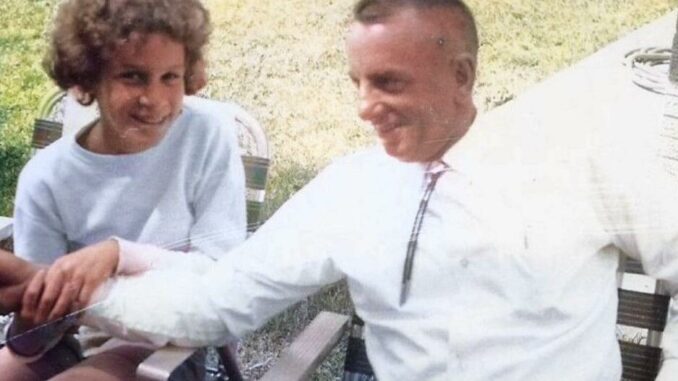
Most dads have a well-worn saying, trotted out in good times, bad times and anything in between. Ahead of Father’s Day, we asked Baton Rouge locals about their father’s favorite, and the response was overwhelming. We’ve haven’t had such a large, or heartwarming, response to a reader question in a long time.
While we couldn’t include all the entries for space reasons, every one brought a smile, and sometimes tear, to our faces. Here are some of our own favorites:
Sue Laporte’s father, Gordon Sylvester Laporte.
Sue Laporte
Sue Laporte’s father, Gordon Sylvester Laporte, was born in the French Quarter in a house on Decatur Street, near Conti, in 1921. He spent his childhood in the Quarter, attended grammar school at McDonogh #15 at St. Philip and Royal streets. His family later moved to a house on Pontchartrain Boulevard, and he attended S.J. Peters High School, leaving to join the Navy and fight in World War II.
This month marked the 20 years since his passing, but the family still says and remembers many of his key phrases, but of all the ones Sue Laporte recalls, there’s one she believed he loved to say the most.
Gordon Laporte often went over and beyond to help his daughter with something she needed — like when her car needed a trip to the shop for repairs, he would drop it off and catch the bus home, or when a file cabinet needed to be picked up because his daughter was going to open her own law office, or a refrigerator for a new home, or a … fill in the blank.
“If I needed it, he would come through to make sure I got it,” Sue Laporte said. “So many, many times that he went out of his way to make my life, or my brother’s life, better or safer. I’d thank him, and he’d say, ‘That’s what daddies are for.’”
Mary Broussard
My dad, Milton Broussard Sr., was a tough Notre Dame-loving high school football coach. “People in hell want ice water!” was a favorite phrase. He once couldn’t get a rap singer’s attention in a free enterprise class and threw the desk with the student in the hall — the rap singer later told a sister that coach at least cared for him.
Dad, who raised 12 children in north Baton Rouge, worked at Baker High, Istrouma High and Redemptorist and Catholic High schools. I miss that tough dad. Many years ago, I was leaving for a job in Kansas City with United Press International and I was first to leave the nest. He couldn’t come outside to say goodbye.

Major Charles Towns and Lois Towns in El Paso before he went overseas in 1942. Charles Towns was stationed at Ft. Bliss before shipping out to the Pacific. He returned in 1945 after being wounded and settled in El Paso with his family.
Tooley Towns
My dad, Maj. Charles Towns, was in the horse cavalry before World War II, and after the war he still had all his old commands. He would tell us kids to “Mount up,” which meant “Get in the car, time to go!”
He was stationed at Fort Bliss in El Paso, Texas, before shipping out to the Pacific in 1942. He returned in 1945 after being wounded and settled in El Paso with his family. He was a highly decorated combat officer, earning two silver stars, a bronze star, two Purple Hearts and the flying medal. We didn’t meet until I was 3 years old.
Nancy Kora
Since I am from a family of 10 children, it was quite difficult for Dad to call out each of our names when it was time to come in for dinner, especially when we were all scattered around the neighborhood. He would sing, “dada dada dada dada dada dada dada dada” very loud about four or five times until everyone was home. The entire neighborhood knew it was him.
As we gathered around our large round table for dinner, he would say the blessings, which ended in “Amen.” Dad was very funny and was always making jokes and rhymes. After “Amen,” he would add, “Brother Ben shot a rooster and killed a hen.” It was not sacrilegious at all; it was just his personality.
Kyle Waters
My father, John W. Waters, was a Marine in World War II — a forward observer who was wounded at Iwo Jima — graduated from LSU with a civil engineering degree and was a commercial contractor all his life. He and my mother had four boys and one girl. Dad made my older brother and me work for him during the summers, mostly doing grunt work like wire-brushing old paint off construction equipment and repainting it, repairing a roof, pouring concrete forms on construction sites, etc. Many times, we had to tidy up and stack lumber at a jobsite or in the warehouse.
When we’d carry long boards, he would remind us that “Every board has two ends.” He said this when I’d carry a long 2×4, turn around and be surprised when I hit something (or someone) with the back end of the board. My father has been gone for 15 years now. I still miss him but do “talk” to him in my mind just about every day, especially when I pick up a board. “Remember, Kyle, every board has two ends.”
Kevin Nee
Growing up one of seven and in a one-income family (Mom didn’t work) I always had a bicycle, but never a new one. The garage housed several bicycles we could use as spare parts, but we would have to do the repairing ourselves. After one such repair job, I came into the house covered with grease from fingertips to elbow. My dad, Larry Nee Sr., looked at me and said, “You can’t tell a mechanic by how dirty he gets.” Metaphorically, I’ve remembered and used that saying for over 60 years.

Angela Leverett calls her father Wesley Leverett “the absolute smartest man I ever knew”.
Angela Leverett
Though he only had a third grade formal education, my father/hero/mini-god/teacher was the absolute smartest man I ever knew. He could calculate angles and slide rulers to build either rooms or entire houses. As a young impressionable girl, I saw him stand tall in the midst of blatant racism — being called uncle, boy and so on — and bravely not responding and walking away.
He pounded into my brain, my heart and my very soul these words: “Always get your own stuff, and never depend on others to get stuff for you.” He first said this to me as I decried the loss of a boyfriend and the tiny TV he had given me for my college dorm. My dad was not one for chitchat or small talk, but came to my room to question my sadness. Upon hearing why I was miserable, he simply left my room and the house. He returned after purchasing a larger TV for my dorm room and made the above proclamation: “Always get your own stuff. Never depend on others to get stuff for you.”
Those words have served me well through the many ups and downs of my 70-plus years of life, 50 years after hearing them spoken with so much tenderness, love and understanding.
William Beck Jr.
Daddy told me to always have a pocket knife and handkerchief with me, to never tuck my T-shirt in my underwear, and to never walk behind a mule or horse with a plow in my hands. Daddy died in 1956 when I was 13 years old: I’m 80 now, and I’ve never plowed behind a mule or horse, I always have my pocket knife and handkerchief with me, and I never, ever tuck my T-shirt in my underwear.
Butch Burt
I grew up in Baton Rouge and my dad coached American Legion baseball for about 10 years. My dad was my best friend and he was a long time American Legion coach in the Baton Rouge area. He taught us teamwork, sportsmanship and many lessons in life. One of his favorite sayings was, “He can’t hit a bull in the butt with a bass fiddle.” Hopefully, he wasn’t referring to my hitting!

Dolphus Lewis, Sr., who believed in the value of hard work.
Carla Lewis
My father, Dolphus Lewis Sr., who also was father to my 10 siblings, believed strongly in the importance of work and that everybody should have a job. He and my mother raised the 11 of us in a modest home in north Baton Rouge in the ’50s and ’60s. In early 1960, just as I was about to graduate high school and head to college, Daddy became one of the many victims of a layoff from his job at Esso Standard Oil (now known as ExxonMobil.) Of course, Daddy wasted no time securing a job as a custodian at a large Baptist church in downtown Baton Rouge. He also worked as a caddy at a local golf course and coined the phrase, “a job is a man.” To this day, that phrase has special significance to me. I have shared it with many others: some who think they don’t need a job, some who don’t appreciate the job they have, and others who feel as if the world owes them and someone else should take care of them, so a job is not important.
Steve J. Crump
While I doubt my father knew he was quoting Shakespeare, he said, at times mournfully, “Every dog has its day.” His was an expression of exasperation, disappointment or defeat, but he’d say it in such a way as to suggest there might be another day when he might triumph or at least be vindicated.
Yet, my all-time favorite expression of his was, “Grab a root and growl.” He never said it at a dinner table: Instead, he uttered it outdoors on our Illinois farm, and each time it called us to some task of heavy labor, one larger than he could muster alone. “Grab a root and growl” probably hearkens back to the days of my forebear pioneers when they, too, had to put muscle and grit into clearing the land. In so many words, he meant, “Come on, lads, we can do this thing. And it’s not up for discussion.”
Lorry Simmons Trotter
My dad was career Navy man. He was one of the few individuals who was at Pearl Harbor when the planes came, and he was also aboard the USS Missouri when the peace accord was signed.
Whatever manual task you were trying, my dad thought he had a better way of doing it. Most of the time he was right. He would always end with “Now, if I tell you a rooster can pull a freight train, you better latch on because we’re fixin’ to get on the way.”

Bill Moore holds his son Tony Moore on a horse in 1957.
Tony Moore
Whenever my father, Bill Moore from Baton Rouge, saw someone doing something that was ridiculous or foolish, his quick response was always “There ought to be a law.”
Bonnie Simpson
If we ever wanted to quit something that was getting difficult, Daddy always said, “If you sign on for the trip, you go all the way!”
John Singleton
My dad, Glen Singleton, had no shortage of “fatherisms.” Some of the more memorable included: “A man can go broke taking advantage of good deals.”
And when things were going poorly: “Everything will look better when the sun comes up tomorrow.” It usually did.
Jimmy Strubb
My father passed away too long ago, but I fondly remember two of his favorite sayings. When one of us received a minor scratch or scrape he would say, “It’s far from your heart.” When we were assigned a task, which happened frequently, his favorite comment would be, “Every job needs supervision” as he watched over the task being performed. Believe me, he supervised me until the day he died. Our children are well familiar with both sayings since I continue them to this day.
Steve Underwood
When our daughter (or someone else’s child) would have a hard time staying still, my dad would say, “She’s like a worm on a hot shovel.”
When watching a sporting event and a particular player was having a great game, he would say, “That kid is hotter than a $2 pistol.” If someone was trying to decide whether they should or should not do something, he would say, “If in doubt, chicken out.” My family use these phrases all the time!

George Bienvenu Jr., a World War Two pilot with no shortage of wit.
Bo Bienvenu
My Father, George Bienvenu Jr., was a C-47 and B-17 pilot in the Army Air Force during World War II. He was noted for his quick wit and carefree attitude. My favorite saying of his is not the best advice I ever received, but it remains my favorite:
“Spend your money and enjoy your life. If things get really rough, you can always strap on a tin bill and peck stuff with the chickens.”
Amy Wise Watson
My daddy, Andy Wise, had many wise things to tell us seven children (six girls and one boy). The one that sticks out to me the most, and which I use still today, is “Sleep with hogs and you’ll catch their grunt.” It means be careful who you chose to have around you!
I love and miss him so much.
Editor’s note: Some entries have been edited for style or clarity.


Leave a Reply